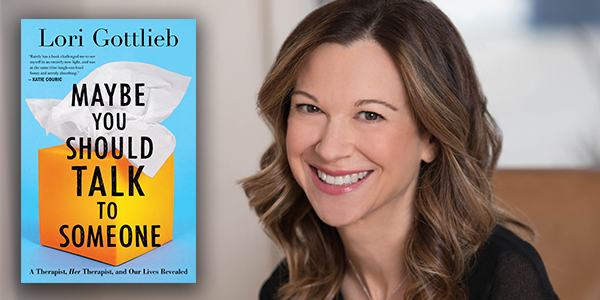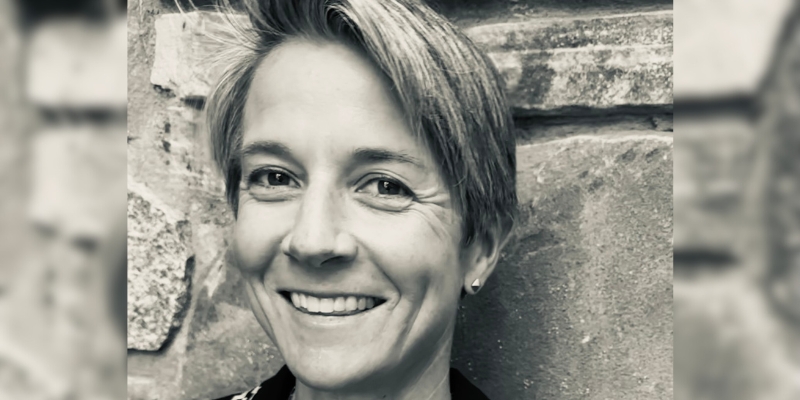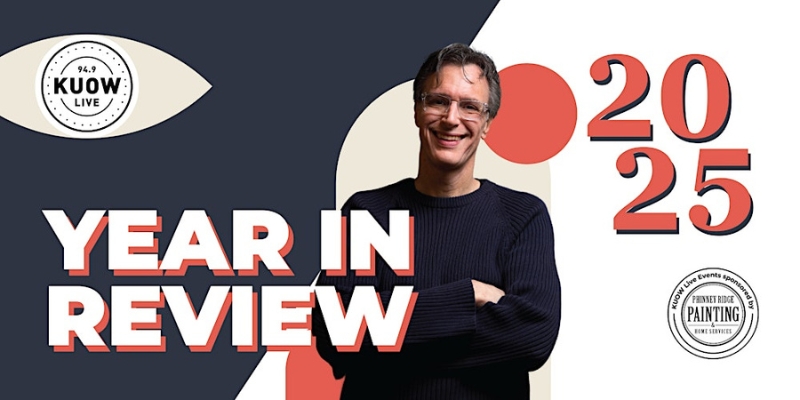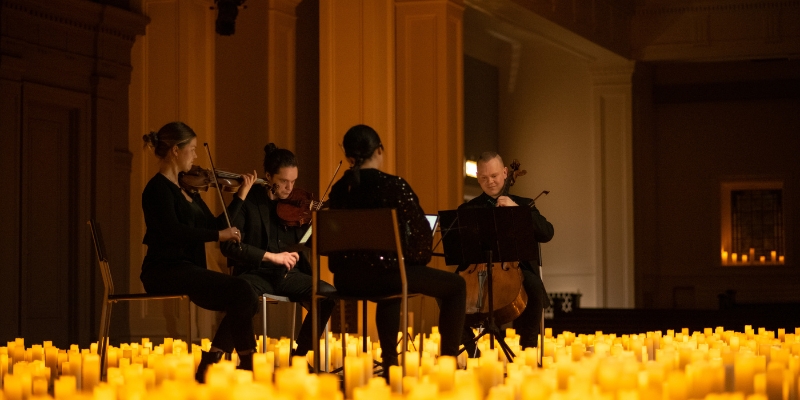Lori Gottlieb is a psychotherapist. Lori Gottlieb is also a human. She, herself, went to psychotherapy. Soon, on April 10 at the Summit on Pike, she’ll talk to Luke Burbank about her career as a psychotherapist, what it means to give advice, and ponders the question of what we all want in life. Get tickets to the event here. To give us a preview of her story she spoke recently with Town Hall’s marketing manager Jonathan Shipley.
JS: What got you interested in psychology and therapy to begin with? Was it your major in college or did you have interest even before that?
LG: I did a lot of other things that seemed unrelated to therapy. I worked as a film and television executive in Los Angeles. I went to medical school. I was a journalist for many years and then I became a therapist. And so all of the things that I was doing were related to therapy in a way that I didn’t realize at the time. When I was working in film and television I was dealing with fictional stories, but they all had a lot to do with human struggles. And then I went to medical school and I saw real human struggles. I later became a therapist and I got to help change people’s lives.
JS: As a kid were you already analyzing yourself, your friends, your parents?
LG: I think I was always curious about psychology when I was growing up. I was very curious about friend dynamics; about my family dynamics. I never envisioned doing it for a living, but I was always curious about why people do what they do.
JS: So how did you finally make the leap into being a psychotherapist?
LG: I’d been working as a journalist for many years. I was really happy as a journalist, but then I had a baby and I realized that there were no verbal humans to talk to during the day. And I thought I need colleagues. I need to get out of the house. So I called the dean at Stanford Medical School, which is where I had been in medical school, and I asked her if I should come back and do psychiatry and she just laughed at me. ‘Wait, you want to come back to medical school?’ She knew about me from medical school and so she knew that I was really interested in the relationships with the patients and being involved in people’s lives as a guide, as someone that they could rely on over time. And so she suggested that I get a graduate degree in clinical psychology and go that route, which is what I did.
JS: What are the skill sets involved in being a psychotherapist? What do you bring to the table?
LG: Well, all of the training and credentials and everything that needed to happen in order to get licensed and then to learn the craft being a therapist. I think that my most significant asset is that I’m a card-carrying member of the human race. That I know what it’s like to be a person in the world. And I think that it’s really important for therapists to be human and to not position themselves as the expert up on high, but as another human being who understands what it’s like to struggle with the daily problems of living.
JS: Is there some amount of hubris involved? That you can change their lives?
LG: We can help them change their lives, but we can’t change their lives for them. They have to do the work and we can be there to help smooth the path so that they can see why they’re getting in their own way. So many times people who come to therapy are shooting themselves in the foot in ways that they don’t realize. I think that I can hold up a mirror to them and say, ‘look at this reflection,’ and do it in a very compassionate way. Say, ‘This is something that you should pay attention to because you keep ending up in the same place and not understanding why. Here are the clues as to why.’
JS: This is probably difficult to identify, but are there any commonalities among all your patients? What is it that we want? Love and acceptance. Is there anything more than that?
LG: We are all very different people in almost every respect. And yet, I think at our core, all of us, we are dealing with the same questions about how to love and be loved. What is it like to be vulnerable? What do we do with our pain? What do we do with the things that we can’t change, and how do we change the present and the future? Why is it so hard to change, even when we really want to? Why do we keep resisting change? How do we deal with the fact that we have a limited time on the planet and we’re all going to die? How do we live the life that we want to live in the limited time that we have to do so? I think all of those questions are the questions that every single person is dealing with in very different ways.
JS: When did you decide that you, yourself, needed therapy?
LG: I was going through something and I didn’t think about calling a therapist. The first person that I thought about calling was my best friend. You can’t go to your friends for therapy, but she said, ‘maybe you should go somewhere where you’re not being a therapist. Maybe you should talk to someone.’ And that’s when I decided to go talk to someone. And as it happens with many of my own patients, the turn of events in my life that took me to therapy was just a symptom to a larger problem.
JS: I am curious as to what you think of the bootstrap mentality—that we can just solve our own problems and that going to therapy is just a sign of weakness.
LG: Sometimes what happens is people who actually find themselves struggling don’t think that their problems are significant enough to get help for them. With our emotional health, if we’re feeling something we often think, ‘well, what do I have to complain about. I’m really functional and all these people in my life love me.’ But struggles are struggles. Therapy isn’t a place to go complain. It’s a place to help you with your struggles. A lot of people feel there is a hierarchy of pain. I don’t think there is. Pain is pain. Your pain isn’t less because you don’t have cancer. Your pain isn’t less because you happen to have a loving partner. Your pain is your pain.
JS: What are some tools for someone battling depression?
LG: Minimizing our feelings or trying to pretend them away doesn’t work. In fact, if we keep up with that stiff upper lip mentality, they get bigger. Suppressing your feelings does not make them go away. People are afraid of those unpleasant feelings. They don’t realize that our feelings are like a compass—they guide us to say something’s not right, something’s not working, and something needs to be paid attention to. I think it’s really important for someone who experiences depression to get help as early on as they can.
JS: Why did you start your advice column in the Atlantic?
LG: I love advice columns. I think there are so many talented columnists out there and I think they’re really useful. I think that a lot of times people need an outside person to look at their situation. I wanted to do an advice column with a twist—I wanted to do what a therapist does, which is to help people see their situation from a different perspective and through a different lens. By doing that maybe they can see their problem differently and make a better choice. I’m not telling them what to do, I’m guiding them in terms of looking at their situation from a different angle.
JS: You must be popular at dinner parties.
LG: There are so many reactions when someone knows you’re a therapist. Some people feel like, somehow, we have x-ray vision into their souls. They don’t want to sit next to you because they don’t want you to analyze them. It’s not like if you sat next to a gynecologist you’d ask if they were about to give you a pelvic exam. I think I understand where it’s coming from, though. I think there’s this this fear: how will you see me? Will you see my shame? My vulnerability? All the things that I try to hide in polite company, will you be able to see it?
JS: What do you wish you knew in your youth that you know now?
LG: I wish I knew that we’re all more the same than different. I think the ways we imagine our lives compared to other people’s lives are often grossly inaccurate. And that we are really all okay the way we are, and even if we need work and even if we are working on changing that, we’re still together in this.
I know this sounds cheesy, but I think that so many times people feel isolated in their situation, their feelings, what they’re going through, and they don’t realize that they’re not alone. Quite the opposite. Everyone is struggling, some in big ways and some in small ways. They’re human. We all are.
We need to have a lot of compassion for ourselves. The more compassion we have for ourselves, the more we have compassion for others.
JS: What don’t you know yet that you wish you did?
LG: I start to look at these existential questions that we all have about love and mortality and I’m made aware that we all have a limited time on the planet. You should live your life in a way that you want to live it and not wait for some unknown date in the future to really do the things that you want to do. And I think we can all live every day that way.

Join Lori Gottlieb and Luke Burbank on April 10 at the Summit on Pike. Tickets are available now.


